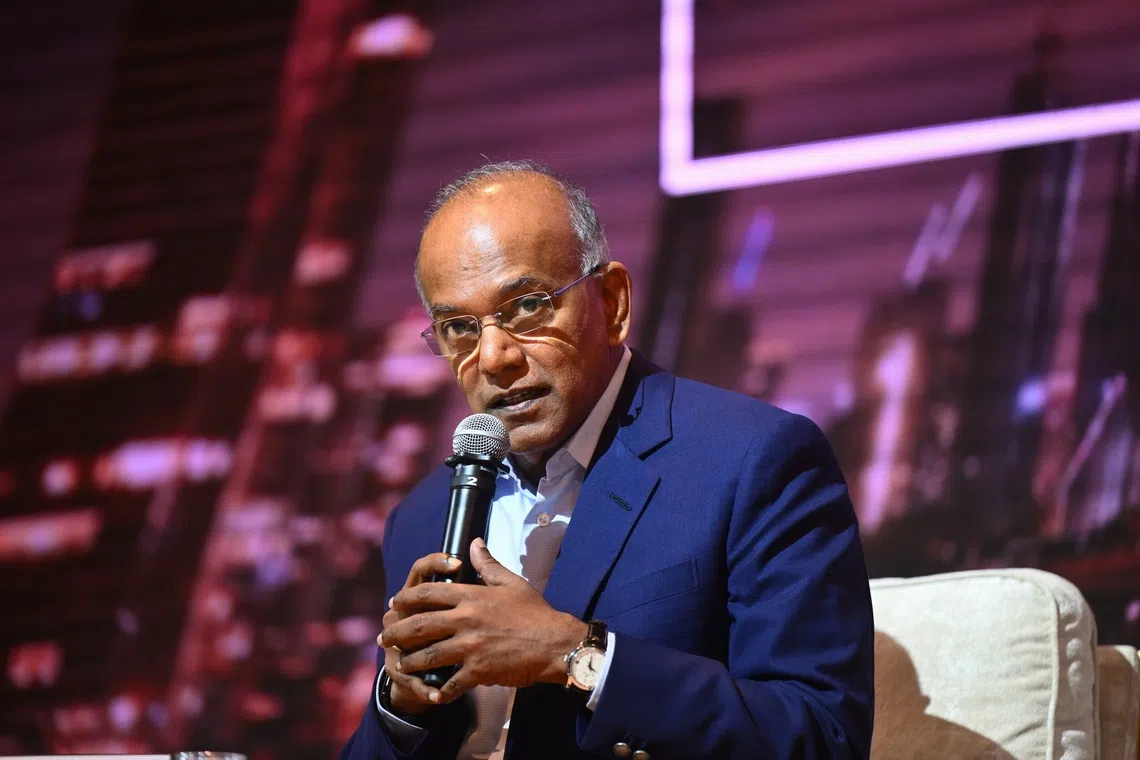Shanmugam lays out S’pore’s approach to helping Palestinians, condemns Israel’s actions in Gaza
Sign up now: Get ST's newsletters delivered to your inbox

Home Affairs Minister K. Shanmugam speaking at the Middle East Institute’s annual conference at Orchard Hotel on Sept 2.
ST PHOTO: AZMI ATHNI
- Singapore aids Gaza practically, not with symbolic gestures like cutting ties, contributing to capacity building with the UN.
- Singapore will launch two initiatives in 2026: training Palestinian police with Japan and sharing governance expertise.
- Shanmugam says foreign policy requires consistency and realism. Singapore cannot influence the US-Israel relationship significantly.
AI generated
SINGAPORE – Singapore has been contributing in various ways to alleviate the situation in Gaza, and plans are under way to do more to help the Palestinians, said Home Affairs Minister K. Shanmugam on Sept 2.
While the city state’s efforts may not make the headlines, this is serious work compared with performative actions such as cutting off diplomatic ties, he added.
Speaking at the Middle East Institute’s annual conference at Orchard Hotel, Mr Shanmugam also said the Republic’s foreign policy has to be consistent, realistic and made with a “non-emotional calibration”.
Responding to a question about calls for Singapore to take a stronger stance against Israel, even breaking off relations to express its disapproval, Mr Shanmugam said the city state has made it clear several times that Israel’s response to the attack on Oct 7, 2023, by Hamas has gone too far.
“Many, including I, think that history will probably be harsh in its judgment of Israel’s actions,” he said. “To think that there can be a complete solution through force of arms, that doesn’t require a just solution. I’m not sure that that will bring about any lasting solution.”
He also reiterated Prime Minister Lawrence Wong’s May 30 remarks that Israel’s actions mean it has likely breached international humanitarian law.
Besides “just reading words”, Singapore has delivered nine tranches and over $20 million of humanitarian assistance to Gaza
Singapore is also working with partners such as the United Nations to help with capacity building for the Palestinian Authority, said Mr Shanmugam.
In 2026, the city state will launch two new initiatives – the first, to train Palestinian civilian police in collaboration with Japan, and the second, to share Singapore’s experience in governance and public administration with young Palestinian leaders.
Its $10 million Enhanced Technical Assistance Package has also benefited more than 800 Palestinian officials through training in fields such as public administration, digitalisation and public health, he added.
“In the longer term, we are committed to contributing to the reconstruction of Gaza once a permanent ceasefire agreement is reached,” said Mr Shanmugam, who is also Coordinating Minister for National Security.
“This is all real; these are all important. Unfortunately, none of them can be put in a single headline that will attract eyeballs because this requires explanation, understanding that this is serious work, hard work.”
Need for consistency in foreign policy
Mr Shanmugam said Singapore has to be consistent in its foreign policy, and that if it cuts or reduces ties with Israel, by a similar logic, the city state would also have to do so with other countries and governments that have committed humanitarian breaches.
He cited the Syrian civil war, where more than 500,000 people have been killed; the Yemen civil war, where hundreds of thousands have also been killed; the Myanmar conflict; and the Russia-Ukraine war, with over a million casualties.
On the basis that one should also cut ties with the countries that supply weapons used in these conflicts, then ties with the United States, France and the United Kingdom should also be cut, he added.
“Bad as the (Israel-Hamas conflict) is, the casualties – and no one can justify them – the point is equally bad or worse things are happening around the world, and our approach has to be consistent to all of them,” said Mr Shanmugam.
While one can get angry at the situation in Gaza, foreign policy has to be realistic and unemotional, he added.
“(This) means that you accept that there are limitations on what you can do, and you work within that framework, and you explain your position to your population,” he said. “I think that’s the best answer.”
Taking this approach also means accepting that, realistically, there is only one power that can deal with Israel, and even so it is “not simple”, he added.
Mr Shanmugam said the US is the only country in the world in a position to dictate Israel’s actions, but despite the significant concerns and differences of opinion with Israel, former US president Joe Biden’s administration “in the end went along with what Israel did”.
The current US administration under President Donald Trump still has significant differences with Israel, though less so than under Mr Biden, but nevertheless the US has not taken any significant action to change Israel’s course of action, he added.
“Do we realistically believe that countries like Singapore, or even larger countries, can overcome American viewpoints which have been pretty much set in concrete over 60, 70, years?” he asked.
“There’s a certain trajectory to American actions vis-a-vis Israel, and one of which is fundamentally to go along with almost anything that Israel does. And I am not, realistically, a believer that we can alter that course.”
Recognising a Palestinian state now won’t change facts on the ground
Mr Shanmugam was also asked if he thought that recognising Palestine as a state could be a step to establishing a two-state solution, and what conditions must be met in order for more countries, including Singapore, to make that move.
The minister said one has to ask whether recognising Palestine as a state very immediately “hurts or advances the Palestinian cause”.
“What counter actions do you expect, and how do you think that it’s going to actually change facts on the ground?” he asked. “My suggestion... is it’s not going to change it in favour of the Palestinians. It’s likely to harm them even more.”
He said that for a Palestinian state to succeed, it needs some physical space, which “Israel is doing its best to prevent”, and a population, when “current actions seem designed to destroy much more of the population or move them out of Gaza”. A viable government is also necessary, he added.
Mr Shanmugam said what is necessary is support for the Palestinian Authority, giving it legitimacy and building it up to a stage where it can govern.
“But again, the facts on the ground prevent the international community from doing that.”



